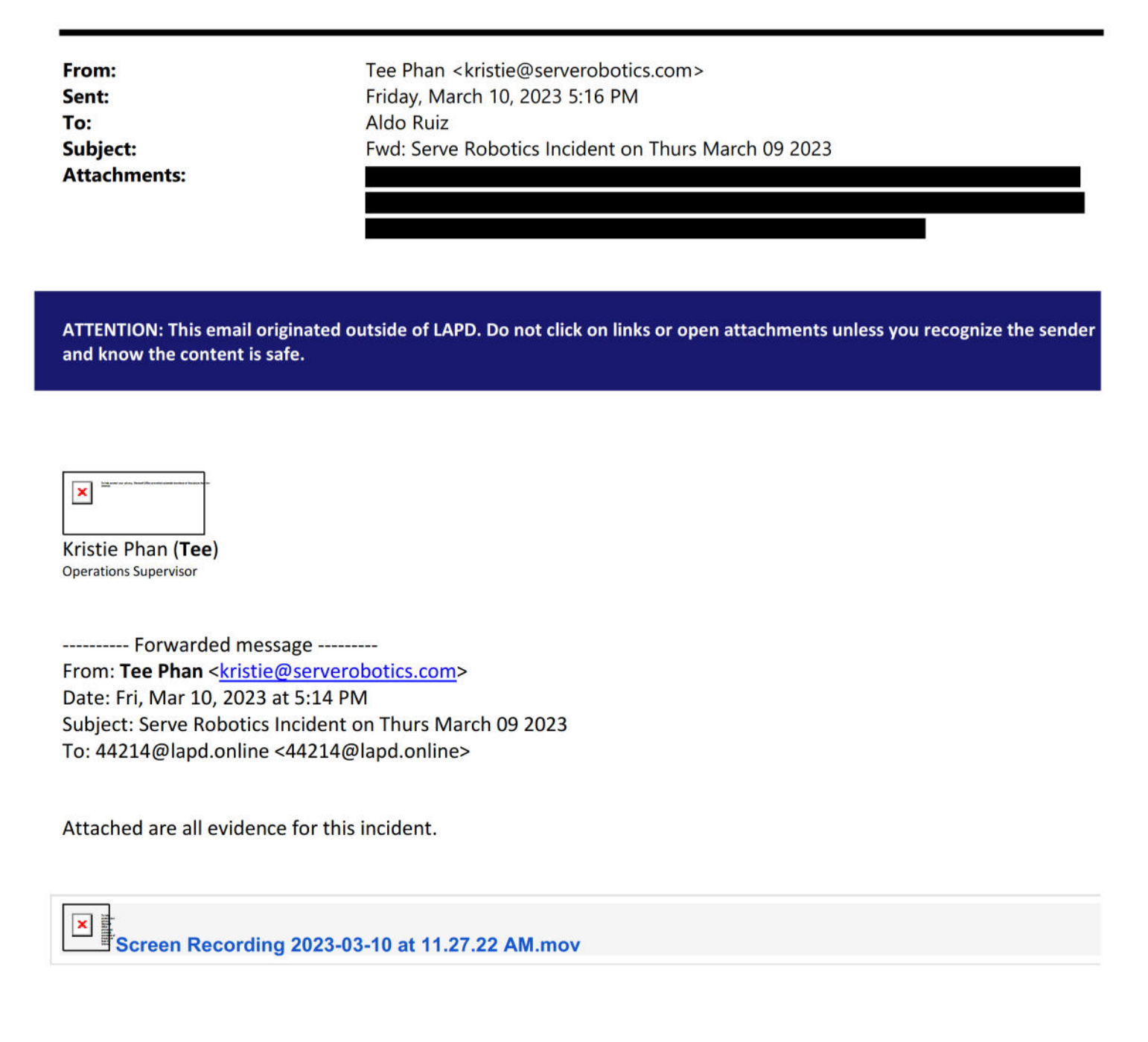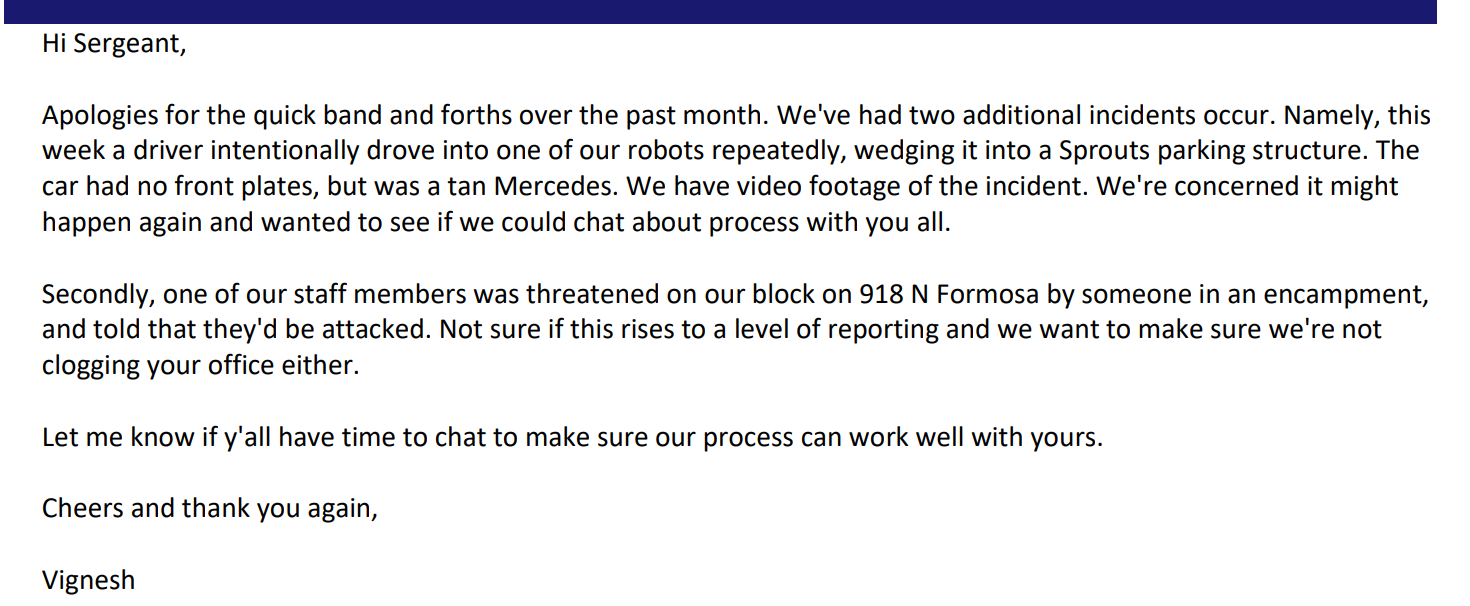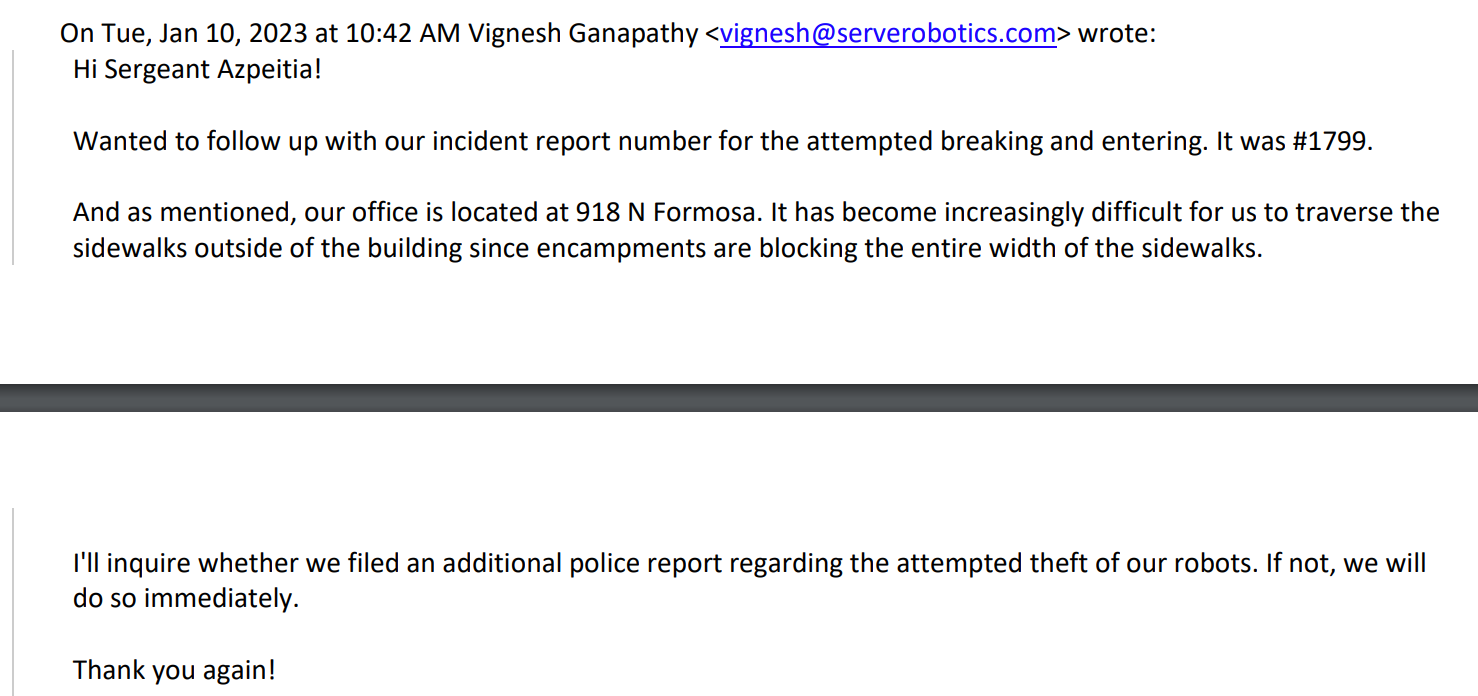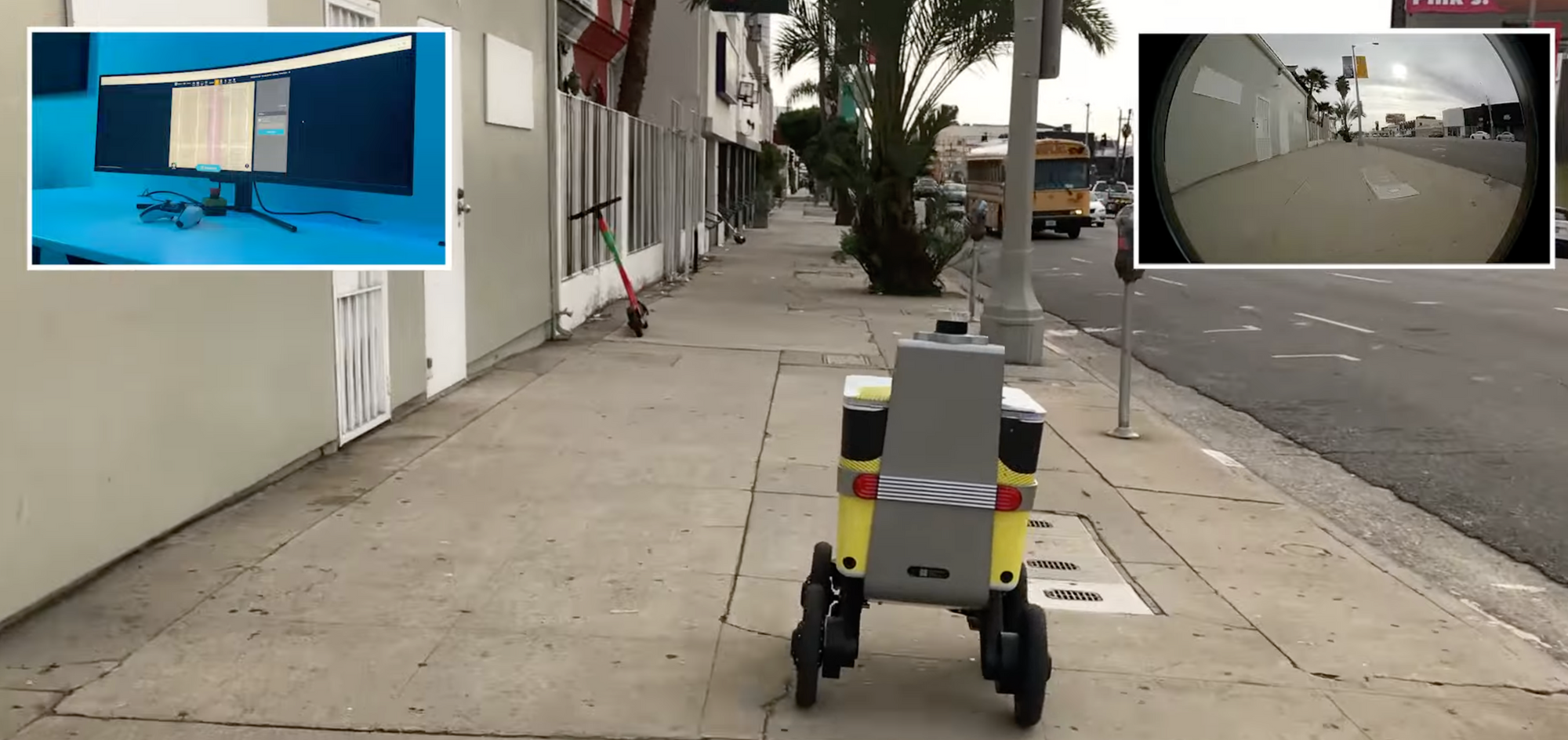Subscribe
A food delivery robot company that delivers for Uber Eats in Los Angeles provided video filmed by one of its robots to the Los Angeles Police Department as part of a criminal investigation, 404 Media has learned. The incident highlights the fact that delivery robots that are being deployed to sidewalks all around the country are essentially always filming, and that their footage can and has been used as evidence in criminal trials. Emails obtained by 404 Media also show that the robot food delivery company wanted to work more closely with the LAPD, which jumped at the opportunity.
The specific incident in question was a grand larceny case where two men tried (and failed) to steal a robot owned and operated by Serve Robotics, which ultimately wants to deploy “up to 2,000 robots” to deliver food for UberEats in Los Angeles. The suspects were arrested and convicted.
“Evidence Submitted from Serve Robotics,” is the subject line of a July 2023 email thread between Aduke Thelwell, Serve’s head of communications, and an LAPD detective. 404 Media obtained the email and others through a public records request with the LAPD. It should be noted that Serve has touted its robots’ autonomous capabilities, and has claimed it’s deploying “AI-powered” robots in the city, but delivery robots are still often driven by remote human operators. Serve writes in its app that the robots are “autonomous, remotely supervised.”
The emails are discussing a redacted subpoena from the LAPD in that case, which the company says resulted in a criminal conviction. “Hi Detective Estrella, confirming that we have uploaded the robot camera footage and a letter confirming the cost of the robot using the link you provided. Please let us know if you need anything else,” Thelwell wrote.

In addition to responding to the subpoena, the company also proactively emailed the video from its robot to the police in March, months earlier: “Attached are all evidence for this incident,” an email containing a .mov file sent to an LAPD officer by Serve employee Tee Phan, who was later identified in other emails as the remote driver of the robot, says.
Food delivery robots from Serve and another company, Coco, are all over Los Angeles and have become a contentious subject in the city as they drive across sidewalks in the city. I live here, and I see delivery robots from Serve or Coco every single day. Their presence is a constant discussion on community social media like Nextdoor and Reddit. A TikTok and YouTube account called FilmTheRobotsLA has been documenting the robots driving around the city, getting in the way of pedestrians and pets, and getting stuck in the middle of sidewalks and roads.
The accounts collectively have hundreds of thousands of followers and tens of millions of views. Last year, a video of a Serve delivery robot driving under a police caution tape through what was suspected to be a potential active shooting event at Hollywood High School went viral (thankfully, there was no shooter.)
I wasn’t able to find more specifics about the court case itself, nor was I able to obtain an incident report from the LAPD because of redactions and a public records exemption that the department cited in which it refused to provide any incident reports to me.
The LAPD told me in a statement “The incident described was a Grand Theft. They attempted to steal the robot. The department is not aware of other similar incidents.” The LAPD then added a vague statement about basic police work and declined to elaborate on its relationship with Serve: “Officers will meet with the person reporting to establish if there is a crime involved. If there is a suspect officers will make an arrest. If the suspect is not at scene officers will complete a report and detectives will do a follow-up investigation.”
After publication, Detective Chica Estrella, who worked on the case, emailed me and said "Without the video, there is no way of identifying the perpetrators, therefore, the video evidence is highly important to prove or disprove a crime occurred. In my opinion, video footage is highly beneficial to our investigations, and is a great tool for both the victims/wits and law enforcement. More crimes are solved when there is a partnership 😉."
Thelwell, the Serve Robotics communications head, told me in an email that “In February, we became aware of an attempted theft of one of our devices in Hollywood … Since this appeared to be serious criminal conduct, we decided it was in the public interest to report this to the police.” She said that the “robot left the scene on its own,” and that police arrived and arrested the suspects.
“We were requested by police to answer questions on the crime and turn over video from our cameras before they are deleted. Like most companies, our policy is to regularly delete camera feed unless otherwise required, and to comply with subpoena requests,” she added. “We were also issued a subpoena to testify, but we were later told we would not be needed in court.”
Thelwell said “In accordance with Serve’s privacy policy and relevant laws, the robot’s camera feed is routinely deleted, unless there are compelling safety or security concerns.” Serve’s privacy policy has not been updated since April 2021, and is focused on its customers, not the people living their lives in Los Angeles who may happen to walk by a robot. The privacy policy only mentions “video” in the context of user-generated content on its app or forums, and states that it shares information “with law enforcement officials, government authorities, or third parties, if we think doing so is necessary to protect the rights, property, or safety of Serve Robotics, those who interact with us, or the public.”
Thelwell also pointed me to a blog post written and published by CEO Ali Kashani this week that explains the company’s policies on working with the police (after publication, Thelwell told 404 Media that the company was not aware of my public records request, meaning that the timing of the blog post and me receiving the records were not related). Kashani’s blog post contained a redacted version of the video the company shared with the police:
Re-uploading the video; turns out you can't cross post from Tiktok! pic.twitter.com/EeA9gF4mmG
— Ali Kashani (@ahkashani) September 28, 2023
“Fun fact: Some genius once tried to steal one of our robots… It didn’t end well (for them),” Kashani tweeted and embedded in his post. “After 5 years of operating delivery robots, this attempt at bot-napping was a first! The incident reignited an important discussion internally about when it is appropriate to engage public services such as first responders or city administrators,” he wrote. “As our robots have rolled throughout Los Angeles and West Hollywood, we’ve found ourselves grappling with new questions. Should the police be informed if a robot is vandalized? What about when an attempt is made to steal a robot?”
Kashani then lays out a set of principles intended to explain to the public how it will deal with requests like this in the future, and states that its “Foster trust” principle “means not using robots for surveillance or other purposes that violate the public’s sense of privacy, and upholding strict data policies that do not undermine privacy.” Thelwell added that "we want our robots to be good citizens of the communities in which we operate."
The problem is that neither Kashani, nor Thelwell, nor the company’s privacy policy actually explain how long it keeps video for, what its surveillance policies are, or how it intends to uphold these policies in the face of, say, a police subpoena. Its privacy policy, notably, is focused on the privacy of its indirect customers who are ordering food, not about the privacy of the broader Los Angeles community that it is constantly filming in order to deliver food for Uber. Uber did not respond to a request for comment.
Kashani’s blog post does mention that Serve informed the police of the incident, but it does not mention that it gave them footage or responded to a subpoena. Instead of clearly explaining to readers how and when exactly Serve collects footage from its robots and what it does with that footage, the blog post frames the issue as part of a quirky recounting of an “attempt at bot-napping” in which Kashani brags that the would-be thieves were arrested and convicted.
Chris Gilliard, a surveillance justice expert and Just Tech fellow at the MacArthur Foundation, told me that “absent some very specific policies, I think we can fully expect they will continue to share footage with the police. I wonder what would happen if the police came to them and made specific requests about surveillance in a particular area? Would they turn that down? I think these companies need to anticipate these issues and get ahead of them. I highly doubt they have a policy addressing that. I can easily envision that, and I didn’t put the product out. It’s not hyperbolic or farfetched, it’s a thing that’s very likely to happen when police want intelligence as these things proliferate.”
As a study 404 Media reported on earlier Thursday argues, most computer vision is eventually used to surveil human beings. Experts have been warning that autonomous vehicles, which are equipped with cameras and sensors, could easily become moving surveillance devices. This incident shows that, in Los Angeles, the same is true for food delivery robots.
“It’s comparable to a lot of the revelations made about so-called autonomous vehicles. They’re just surveillance wagons,” Gilliard added. “Not only have they taken over and co-opted the spaces pedestrians use, but they’ve also increased the potential level of surveillance throughout the areas they are patrolling or delivering. I don’t want to be hyperbolic, but I think it’s very dangerous.”
A ‘Dialogue’ and ‘Partnership’
Because the robots take up public spaces and are sometimes seen as a general nuisance, they have become a target for vandals and a frequent target of citizen complaints. There have been many incidents of LA residents attacking or otherwise messing with the robots, which has become a constant topic of concern among executives at Serve and Coco (an email I obtained from Coco to the LAPD says “Occasionally we have people block our bots or attempt to break into them. Do you have time for a quick call in the next few days?” Coco did not respond to a request for comment.)
While Serve insists that this specific incident was an anomalous situation in which robot footage was shared with police, the company has mentioned surveillance footage to the LAPD before, the emails I obtained show.
In January, Serve's head of public policy Vignesh Ganapathy emailed an LAPD sergeant to notify him that “a driver intentionally drove into one of our robots repeatedly, wedging it into a Sprouts parking structure. The car had no front plates, but was a tan Mercedes. We have video footage of the incident,” he wrote. “We’re concerned it might happen again and wanted to see if we could chat process with you all.” The officer responded to set up a phone call with Ganapathy. The email does not say if the footage is from the robot or from another type of camera.

The emails I obtained also show extensive communication between the department and Serve about several incidents of robot and office vandalism, and employees of Serve repeatedly have asked the LAPD to help it prevent people from attacking its robots. According to the emails, both Serve and Coco have specifically and proactively sought close relationships with the LAPD, and the LAPD has reciprocated interest in a “partnership” multiple times, according to the emails.
The emails show that, after Serve reached out last year “to open a dialogue between our business and the Los Angeles Police Department,” police visited its office. “We will continue to work in partnership,” an internal email sent among LAPD officers stated about the nature of their relationship with the company.
“Thank you so much for meeting with us last month to open a dialogue between our business and the Los Angeles Police Department,” a consultant hired by Serve wrote in an email to an LAPD officer in August 2022 seeking to meet with LAPD officers in five different neighborhoods. The robots “are expensive to manufacture and it’s valuable to our bottom-line for these devices to operate within safe corridors within the city. However, we care deeply about ensuring that our neighbors feel safe and that we are not provoking responses among local residents,” he added.
The LAPD jumped at this opportunity: An officer forwarded the email to her colleagues and said “Please ensure that the captains from Hollywood and Wilshire reach out TODAY and advise that they have made contact to set up a meeting. Thank you.” Follow-up emails show that LAPD officers eventually spoke to a series of Serve executives to “start a dialogue.” Serve invited police to their headquarters to “get a demonstration on their operations,” one of the emails said. “We’d love to find time to chat about our sidewalk delivery robots and how we can work with your staff,” Ganapathy wrote in an August 2022 email.
In Kashani’s blog post, he writes that one of Serve’s new policies is “Don’t strain public resources.”
“When relying on public resources, whether that is sidewalks, first responders, or city administrators, we have to be thoughtful about not straining them,” he said. As mentioned, Serve’s robots have been repeatedly criticized for blocking sidewalks and for making the city more difficult to navigate for people using wheelchairs, pedestrians, and pets.

So, maybe it’s ironic that, in an email to the LAPD about an attempted break-in at Serve’s office, he complained about unhoused people blocking the sidewalk: “It has become increasingly difficult for us to traverse the sidewalks outside of the building since encampments are blocking the entire width of sidewalks.”
Update 9/28/23: This article has been updated to include additional information from Thelwell on the publication timing of Serve's blog post and with additional comment from the LAPD detective who worked on the case.


